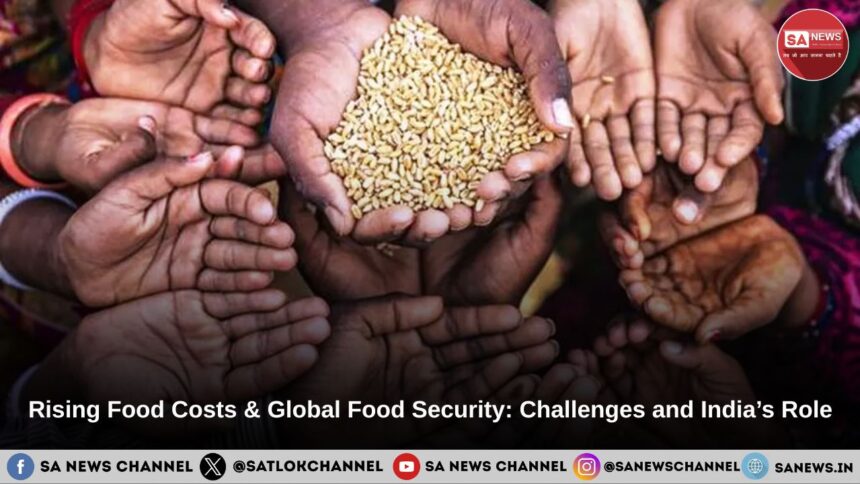Rising food costs exacerbate global food insecurity by disproportionately affecting the poor, leading to reduced consumption and nutritional quality, which can hamper economic growth. For India, this is a major concern due to its large undernourished population, the high percentage of household income spent on food, and the significant impact of inflation on staple goods. Key issues include malnutrition, especially among children, vulnerability to price shocks, and the potential for social unrest.
Key issues of rising food costs and global food security
- Impact on the poor: Poor households, which spend a larger portion of their budget on food, are hit hardest. They may reduce their total food intake or switch to cheaper, less nutritious staples, leading to malnutrition and a higher burden of disease.
- Economic consequences: Food insecurity can lower cognitive ability, reduce work performance, and lead to substantial productivity losses, hindering national economic development.
- Nutritional impact: Rising prices can lead to a diet lacking in essential nutrients like protein, vitamins, and minerals, even if calorie intake remains the same. This can worsen nutrition-related health problems like anemia, especially among women and children.
- Vulnerability to shocks: Factors like climate change, population growth, and political instability can create price volatility and food supply disruptions, increasing vulnerability for both individuals and countries.
Key Global Issues Behind Rising Food Costs
Global drivers of rising food costs include climate change, geopolitical conflicts, supply chain disruptions, and high energy and fertilizer prices. These factors create a cycle where extreme weather damages crops, conflicts disrupt trade routes and cause export restrictions, and high energy costs increase everything from fertilizer production to transportation expenses. The combined effect of these interconnected issues leads to higher production costs and reduced availability of food globally.
Consequences for Global Food Security
Consequences for global food security include severe health problems like stunting and malnutrition, with long-term effects on physical and cognitive development. Economic impacts range from lower productivity in adults to higher food prices and reduced household income, which can fuel a dangerous cycle of poverty and unemployment. Additionally, food insecurity can lead to increased political instability and conflict over scarce resources.
Spiritual Insight: Sant Rampal Ji Maharaj’s Teachings on True Prosperity
Sant Rampal Ji Maharaj emphasizes that true prosperity and food security come from righteous living (Satbhakti) and harmony with nature, as guided by the Holy Scriptures. He teaches that when humanity moves away from greed, violence, and overexploitation of resources, nature restores its balance – ensuring abundance and peace for all.
According to His teachings from Sant Rampal Ji Maharaj’s sermons and the holy book “Gyan Ganga,” global crises like hunger and inflation are results of moral and spiritual imbalance. He advocates for a simple, spiritual lifestyle where people adopt vegetarianism, compassion, and truthfulness, which naturally support sustainability and reduce exploitation of the environment.
“When people live according to God’s true path, nature supports them – rain falls on time, crops flourish, and no one sleeps hungry.”
Sant Rampal Ji Maharaj
Incorporating such spiritual values alongside economic and environmental reforms can help create a world where both material and moral hunger are eradicated.
Conclusion
Rising global food costs present a multifaceted challenge — economic, environmental, and humanitarian. For India, ensuring affordable food access, sustainable agriculture, and resilient food systems is crucial. Coordinated policies on climate adaptation, trade, and nutrition will determine whether India can safeguard both its own food security and contribute meaningfully to global stability.
FAQs
Why are global food costs rising?
Ans: Due to climate change, supply-chain disruptions, higher input & fuel prices, conflicts, and rising demand.
What is food security?
Ans: Ensuring everyone has adequate, affordable, nutritious food — covering availability, access, utilisation, and stability.
How does this affect global food security?
Ans: Higher prices make food less affordable, especially in poorer nations — increasing hunger and malnutrition.









